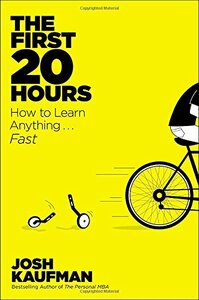Take a photo of a barcode or cover
First three chapters are really useful, remainder of the book are examples, which I found a bit less useful. The premise/idea of rapid skill acquisition is interesting. Worth reading.
hopeful
informative
fast-paced
Honestly all the useful information in this book is the first few chapters which is less than 40 pages. All of that is pretty much common sense or someone else’s research, nothing in the actual theory of the book is original.
There are websites online that summarise the worthwhile parts of the book into a few pages. If you read those summaries you won’t miss anything worthwhile.
There are websites online that summarise the worthwhile parts of the book into a few pages. If you read those summaries you won’t miss anything worthwhile.
informative
fast-paced
I found this a frustrating read. The basic principle is fine but frustratingly light on details.
I didn’t enjoy this book as I found it repetitive. I listened to this book on Headway, which this may be why, but I didn’t feel like I learnt anything from this. I may look into buying the book to see if it is any better, and see if I can learn anything but it wasn’t the best book.
challenging
informative
reflective
medium-paced
This book contains pretty much the things everyone already knows or should know. It is obvious that you have to start with the basics when learning or acquiring a new skill. It is up to you, then, to try to discover what is it all about, or you can go the extra mile and master it, by going beyond the fundamentals of your area of interest. I go after the principle "figure it out" and let my spontaneous decisions decide whether I want or not to further continue gaining knowledge about the desired topic.
All nonfiction March: Book 2
I've always found it easy to acquire new skills; I don't why I'm reading this. I just wanna see what the author has to offer in this book. I have low expectations, though.
..........
2.5 stars
Not really useful
I've always found it easy to acquire new skills; I don't why I'm reading this. I just wanna see what the author has to offer in this book. I have low expectations, though.
..........
2.5 stars
Not really useful
Mildly interesting, but I got the point in the first couple of chapters. I didn't really need to hear about the author's learning to program, windsurf, play the ukulele or play a Chinese board game. Would have been a nice magazine article.
Like many people, I have a ton of skills I would like to learn. In fact, the list is overwhelming. I know I’ll never have the time to tackle even a fraction of them. So I’ve been focusing on the things that interest me the most: blogging, painting, drawing, scrapbooking, card making, journaling, writing, baking. But even that pared down list seems overwhelming. I don’t have 10,000 hours to dedicate to each one of those pursuits. But then again, I also don’t want to become a world-class expert in any of them. I just want to be good — okay, maybe really, really good. So imagine my excitement when I came across this book. I can get really good in just 20 hours? REALLY? Wow. Awesome! Unfortunately, if it seemed that the premise of this book was too good to be true… well, it was. The first couple of chapters are wonderful. The author describes his theories, and they make sense. But after that brief introduction, he goes in depth into his own interests: yoga, programming, windsurfing, etc. I assumed he’d be talking about how he learned these skills, but instead, it’s almost as though he’s trying to teach us those skills. The content is extremely dry, and not helpful at all if you’ve got other skills you have to learn and have no interest at all in, say, learning to play Go. I was very disappointed. Such a great premise - so poorly executed.




